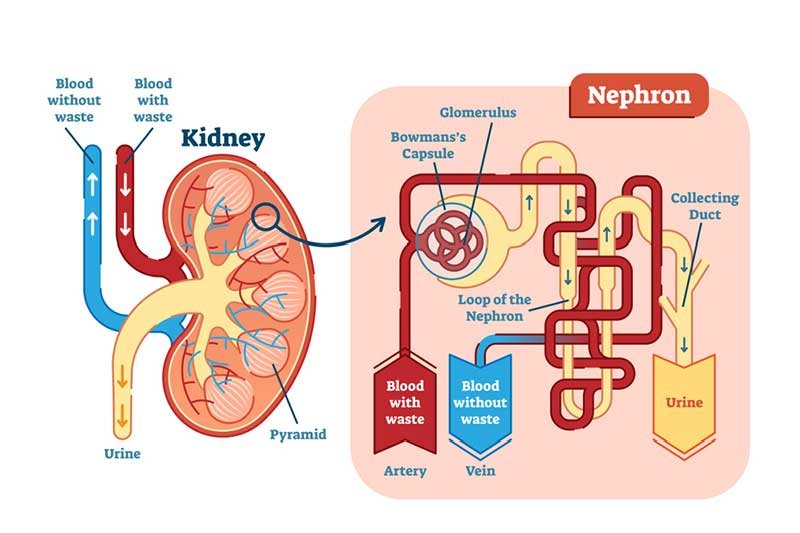Kidney and its functions
The humans have two kidneys located by the two sides of the spine just below the rib cage. The kidneys are small in size and shaped like beans.
Kidneys are very important for our survival, scavenging all the wastes and fluids which we generate in different processes of getting energy for the growth and survival. Every minute the kidney is capable of filtering half-cup of blood.
The kidneys remove the filtered waste and extra fluids by making urine which is passed through the urinary tract. The urinary tract includes the bladder, ureters and kidneys.
The kidneys also remove the acids which are produced by cellular activities. The other important job of the kidney is to maintain the perfect balance of salts, water as well as minerals. Sodium, potassium, calcium and phosphorus are the important minerals and salts of the body.
Any imbalance in the above salts, minerals and water causes malfunctioning of the body. But for the perfect balance of salts and minerals the muscles, nerves and tissues will not be able to function properly.
The kidneys are also responsible for making hormones which helps in the following vital functions of the body:
- Regulating the blood pressure
- Producing red blood cells
- Making strong and healthy bones
Working of the kidneys
The working of the kidneys is quite complex. Each kidney comprises millions of filtering units which are called nephrons. Inside the nephrons there are the filters which are called glomerulus and tubule.
While the glomerulus does the filtering job, the tubule sees that the necessary substances are returned back to the blood and only the waste substances are removed.
The glomerulus is nothing but tiny blood vessels having thin walls. The thin walls of the glomerulus allow only the very small molecules including the waste, water and some fluids. Thus the larger molecules such as proteins etc stay back in the blood.
The blood vessels and the filtered fluids run alongside in the tubules where the blood absorbs all the needed minerals and nutrients along with all the water. The removed waste and fluids are then passed out as urine.
The functions of the kidneys are so important that the blood has to pass through the kidneys a number of times a day. It is estimated that the kidneys can filter about 150 quarts of blood in a day. But only 1 to 2 quarts turn into urine. The rest is reabsorbed by the blood as nutrients and water.
Kidney diseases
When the kidneys are unable to filter the blood with 100% efficiency many symptoms may start occuring. In the primary stage of the kidney disease significant symptoms are not noticed. Many symptoms of kidney diseases seem to be common for other prevalent diseases often misleading the doctors. Due to this reason many people with kidney diseases fail to know about the diseases till they reach chronic stages. It is estimated that 10% of the world population are affected by chronic kidney disease.
Some broad reasons for kidney diseases are high blood pressure, diabetes and hereditary reasons.
Some of the probable symptoms of kidney diseases are:
- Feeling tired, lacking energy and concentration. Such symptoms may be due to the accumulation of toxins in the body
- Trouble sleeping.
- Dry skins may be the symptom of lack of minerals as well as bone diseases which may be caused due to kidney disease.
- Frequent urination
- Blood in urine
- Foamy urine may be the sign of protein in the urine
- Puffiness under the eye is a sign of protein leaking into the urine as the kidney is unable to filter the blood properly
- Swollen ankles as well as feet is caused due to the retention of sodium
- Lack of appetite due to building up of toxins in the blood
- Muscle cramps may be caused due to improper balance of minerals such as calcium and phosphorus.
Kidney diseases and their causes
Glomerulonephritis
This is a group of diseases in which the filtering units of the kidney are inflamed and damaged. This is a common kidney disease.
Polycystic kidney diseases
This is a kind of inherited kidney disease. Cysts are formed causing disruptions in the functioning of the kidneys.
Autoimmune diseases
Lupus nephritis is one such autoimmune disease in which inflammation occurs in glomerulus affecting the filtering process of the kidneys
Kidney stones, enlarged prostate glands and tumors may lead to kidney diseases by obstructing the flow of urine causing repeated infection of the urinary tract.
Clinical tests for ascertaining the kidney diseases
- Ratio of albumin to creatine
- Creatinine test
- Glomerular filtration rate ( GFR )
- CT scans
Chronic kidney diseases ( CKD )
CKD is a condition when the kidney fails to filter the blood causing many debilitating symptoms. Unfortunately there is no cure for CKD. The treatments which are available with the medical professionals are only symptomatic with an aim to relieve the patients of the pains caused by the symptoms and prolonging the life of the kidneys.
The treatments are:
- Controlling other issues like blood pressure, diabetes and high cholesterol level.
- Some changes in the life style so as to stop further deterioration of the condition
- Dialysis is a process in which the blood is filtered by an external machine. It needs to be done at intervals and is quite costly.
- Kidney transplant is a better option giving somewhat freedom from regular dialysis. The hurdles are getting a matching kidney donor, taking immunosuppressant drugs lifelong to protect the new kidney from autoimmune attack.
Future treatment options
Extensive research is going on to find newer approaches to the treatment of CKD. With the advancements in medical technology, solutions are being sought even at the cellular level utilizing the statistical concepts and the advanced computer technology such as 3D printing, modeling etc.
Large biobanks are being created to assist the studies related to various causative factors of CKD opening newer insights and promising revolutionary treatments in the near future.
UK biobank is one such bank from which the researchers are getting active support for carrying out different advanced research.







